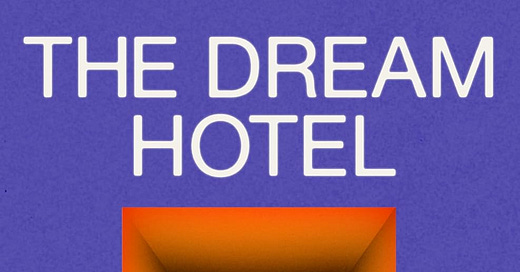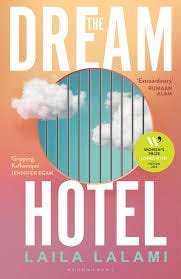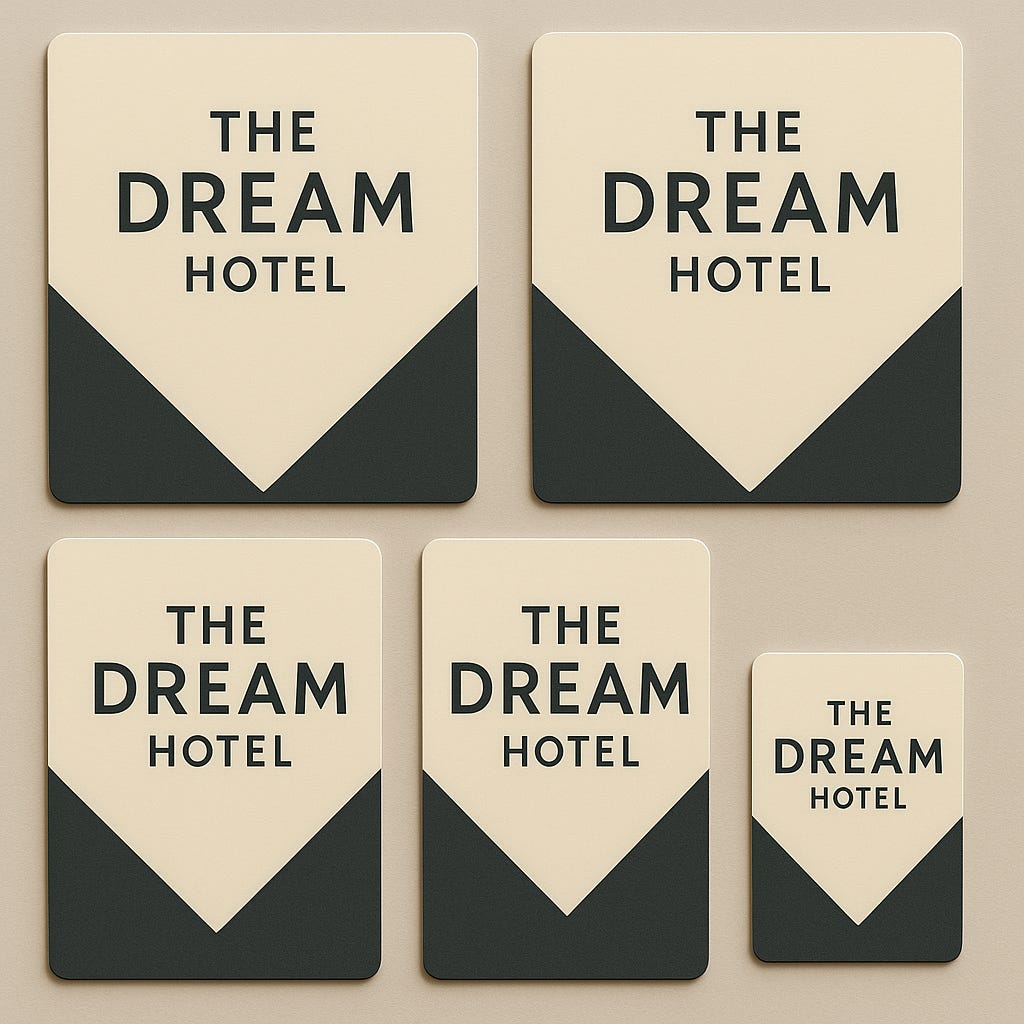I’ve written a few reviews recently singing the praises of a beach read. You know the type? The kind where you can just sit back, relax, turn your brain off, and enjoy a juicy story.
Well, this isn’t one of those books.
The Dream Hotel by Laila Lalami is really great. It really is, and I hope you’ll see why over the next 5-10 minutes of reading here. It is not, however, an easy book. It’ll make you think. It’ll make you question your assumptions. Ultimately, it will make you feel like a more insightful and compassionate (and/or angry) member of society. I think everyone should read it…
…but I totally understand not wanting to.
Before talking about a society where every click is tracked and judged, here’s some clicks you can make that will not be judged (as far as you know):
Spoiler-Free Summary
In a near-future dystopia1 Sara Hussein is detained by the Risk Assessment Administration (RAA) as she returns home from a work conference. The crime? None. That’s not the RAA’s purview. The RAA has determined that Sara’s risk score, an amalgamation of data collected from thousands of sources2 and calculated by algorithm, is too high and she must spend time at Madison, a definitely-not-a-prison-don’t-call-it-that where she remains under observation until her risk score lowers to acceptable levels. Otherwise, she is at risk of harming her husband.
Spoiler - it’s not that easy.
The Good
The Dream Hotel is a book with a lot to say. I tried to make a list of the different topics this novel touches upon and it’s lengthy:
Surveillance state
Feminism
Friendship
“Othering”
Family
Activism
Social media
Commercialism
Prison-industrial complex
Climate change
Artificial intelligence
Loneliness
Etc
If you haven’t read the book and look at that list, you’re probably thinking, “This sounds like a preachy convoluted mess”. I would think the same, but there’s a reason Laila Lalami has been a finalist for the Pulitzer Prize for Fiction, the National Book Award for Fiction, the Kirkus Prize, won the American Book Award, the Hurston/Wright Legacy Award, the Orange Prize, a Fulbright Fellowship, and a Guggenheim Fellowship.3 I mean, look for yourself:
She is such a deft and talented writer that all of these themes and ideas are just seamlessly woven into a compelling narrative. The larger ideas are very prominent, but at the same time, they kind of sneak up on you. You find yourself thinking about these issues before you realize you’re doing it. It’s really some kind of literary magic trick.
The Dream Hotel never sacrifices story or character for the purpose of preaching its message(s). All the characters are very fully realized, even those that only appear for a bit. The plot has a couple of issues (more later), but for the most part is engaging and compelling. In fact, there’s a plot twist about 1/2 to 2/3 of the way through that made me audibly gasp. When it was all over, I found that I felt true affection and compassion for the characters with which I had spent this time. If that’s not the mark of a gifted author, I don’t know a better one.
The Bad
Inelegantly: This book be slow as hell. More elegantly…
I think this might be by design, but the pacing of The Dream Hotel is…shall we say….leisurely. Remember that this is about a group of women living out the drudgery of unjustified imprisonment. Their day consists of meal time, mindless work shifts, and the occasional bit of mail. Part of their oppression comes from the system’s desire for them to be automatons; if Safe-X (the company running Madison) could remove the “retainees’” tongues and frontal lobes, they likely would. As such, the pacing, I think, is purposeful to make the reader feel the crushing weight of monotony these women are experiencing.
However, that doesn’t mean it’s not slow. Anyway, next complaint.
If you’re a fan of dystopian stories, you’ll notice some heavily similarities to other well-known works in the field. Minority Report4 comes to mind, as does Franz Kafka - at one point, Sara takes The Metamorphosis out of the prison retention center library. There’s nothing wrong with any of this. As Picasso pithily put it, “Good artists borrow, great artists steal.”5 So what am I putting it in here for? Well, if you’re looking for a really innovative plot, this probably won’t scratch the itch. There are some very unique portions, especially those that deal with current and near-future technology and how it might interface with all the rest, but none of it is going to be wholly new.
Audiobook
I experienced this one in audiobook form6 and the narration by Frankie Corzo and Barton Caplan was very good. Corzo covers the majority of the book, while Caplan reads out any bits of emails or meeting minutes - things that aren’t the narrator or coming from an actual human. I don’t have many notes on the latter, as it’s a relatively small bit of the writing and is just kind of…read. Corzo’s performance, at first, I found a little lackluster, but I settled into it quickly. As mentioned previously, the languid nature is part of the point, and the narration serves that well. Overall, maybe not a perfect ten, but very listenable and enjoyable.
Final Thoughts
The morning of this writing, I had a meeting at work where we discussed a new technology coming to our industry soon. Without getting too inside baseball (or breaching our CDA), it would, with consent, track a subject’s health and health-related activity across a vast number of sources. I immediately was struck by how similar this sounded to The Dream Hotel, and happily (frighteningly?) it gave me some interesting perspectives to share and consider. It also gave me a cold, heavy pit in my stomach to realize how close we were to Laila Lalami’s dystopia.
If I were a college professor, I would absolutely assign The Dream Hotel on my syllabus. It has so much to chew on and consider between its covers, and I’m so glad I read it. I have a feeling I’ll be coming back to it in my mind as these themes come up in the news and my own life.
If I were trying to take a break from the news and troubles of modern day life, I would run from this book as fast as my blissfully ignorant feet could take me.
5/1 Stars
Hannah on Goodreads gives 5 stars and echoes my sentiment about how close we are to The Dream Hotel:
Yesterday, a Caribbean woman came to my house to buy some tables off Facebook Marketplace. She was in a state of clear distress when she arrived. I had no idea why, but when she told me, I felt emotionally arrested: she had come because she needed the tables, but she had come in fear because she wasn't sure I was legit - she was afraid my ad was an ICE ruse (ICE = Immigration and Customs Enforcement). I was flabbergasted. Then in reading this book, I am reminded of how little it takes for abuse of power to be wielded - even though I was obviously not ICE, I could've easily called in a tip that a woman whose English was clearly not native had just visited my home. I would have had enough information from her Facebook page for ICE to find her, and regardless of whether she was here legally, there's a chance she would've been detained anyway. This woman, who had two children and was an educator, who gave me a bear hug of gratitude at the end of our transaction (for not being ICE) - she could easily have been Sara.
Zeenah, also on Goodreads, gives 1 star with a very deep reasoning:
I didn’t finish it because a quarter way through I saw it’s a Read with Jenna selection and I’m very judgmental.
Who Should Read This?
No flowchart here. It’s pretty simple - if you’re in the mood for something deep to sink your teeth in, pick this up. If you want some escapism (no judgment, unlike Zeenah above), skip it for now.
Rating
The Dream Hotel receives my much coveted 4.75/5 hotel key cards.
Until next time, keep dreaming of electric sheep.
I guess “dystopia” depends on your political and social leanings, but if you find this setting a utopia, we would not be friends.
The most worrying of which is a brain implant Sara received to help her sleep that records her dreams.
Sure but I won my DARE essay competition in 3rd grade so…get in line, Laila.
Philip K. Dick, originally, but more popularly, Spielberg’s film of the same name and story.
Ironically, or fittingly, he borrowed/stole this idea from T.S. Eliot, who referenced Shakespeare, who lifted plotlines and scenes from other writers.
By the way, if you don’t consider audiobooks reading, go kick rocks you luddite.







An insightful summary of a complicated issue.Are we headed in that direction with this government?! Scary!